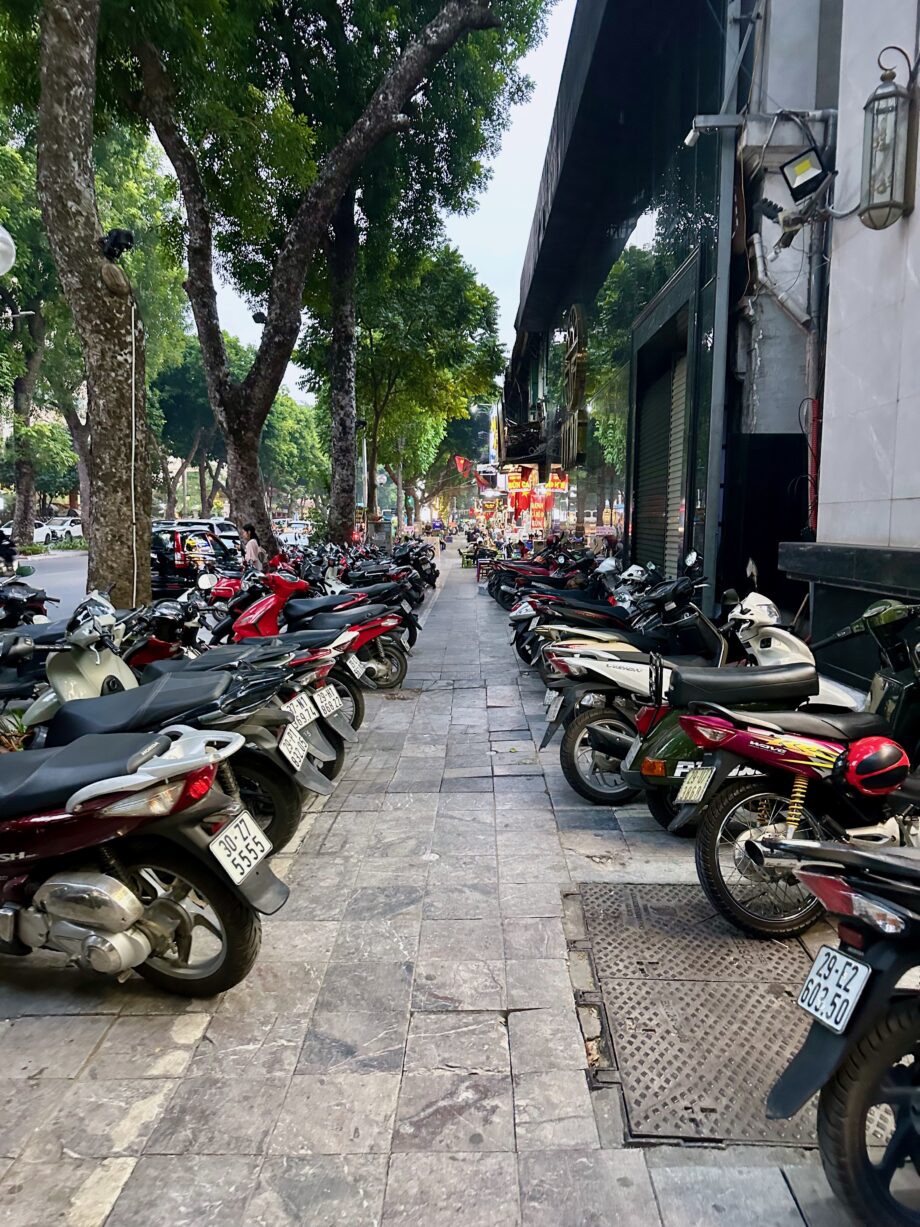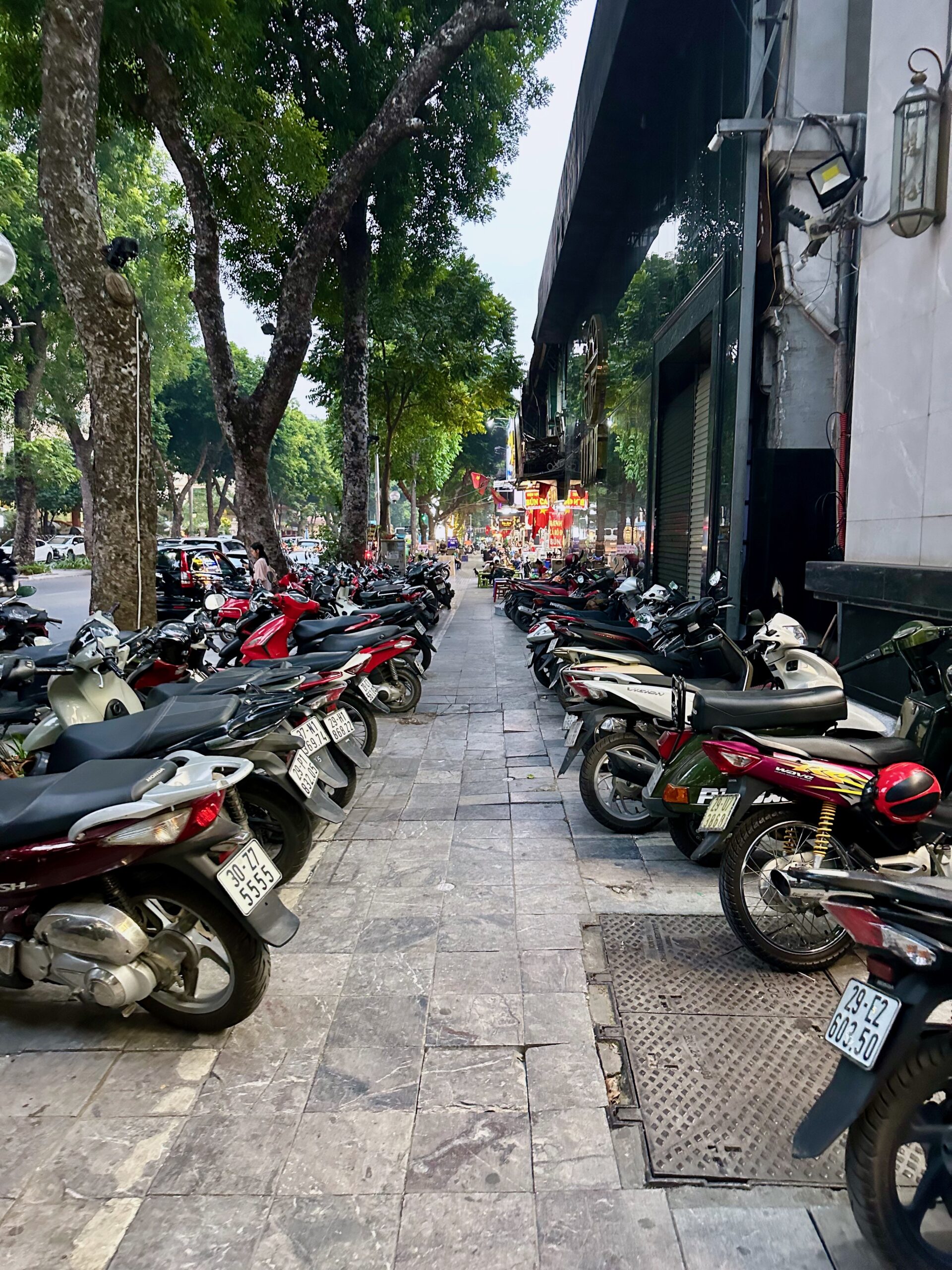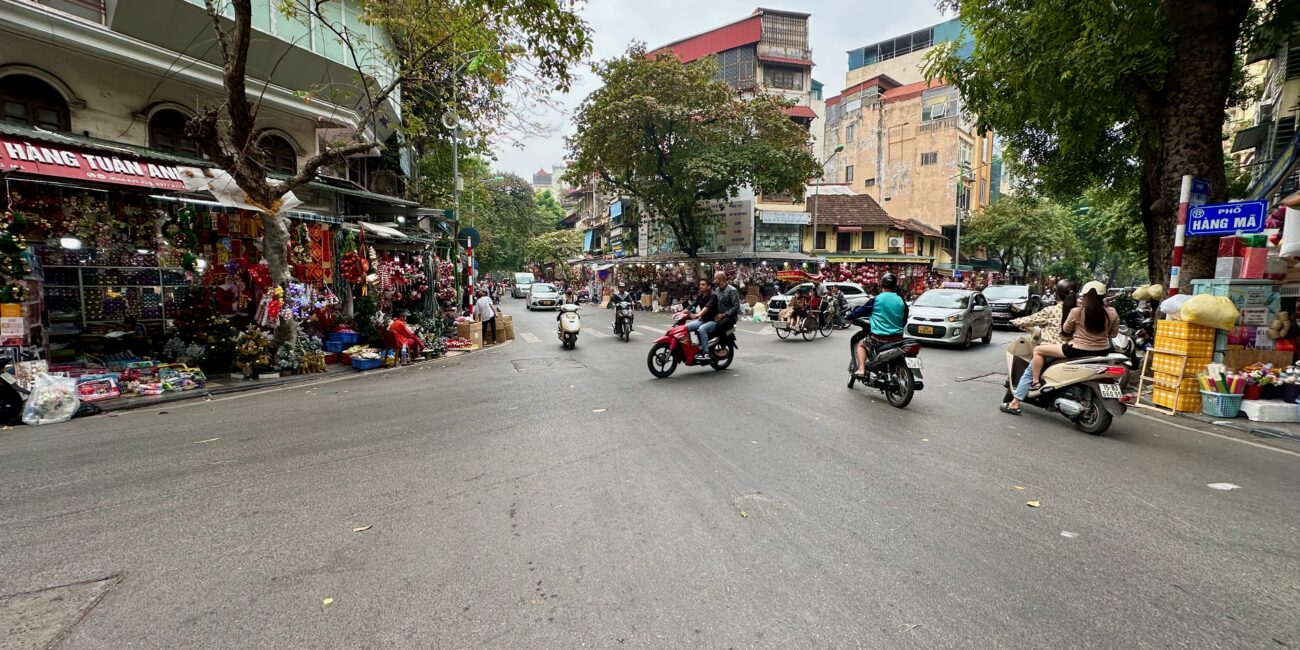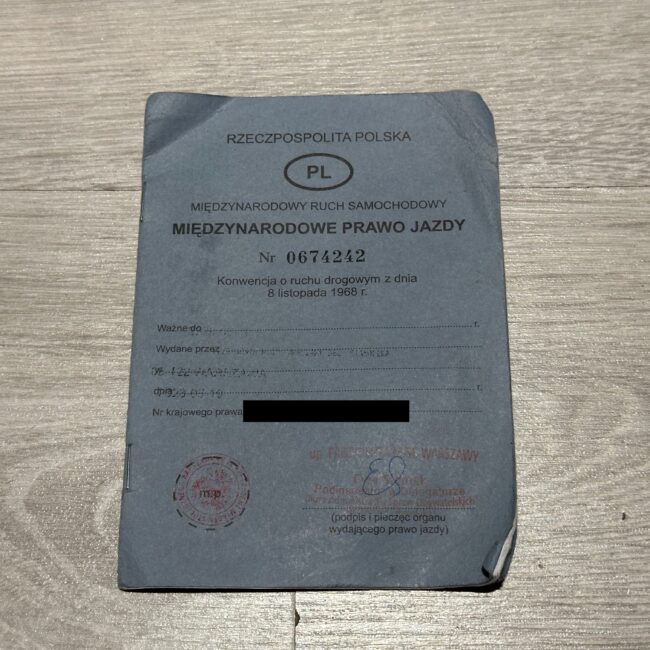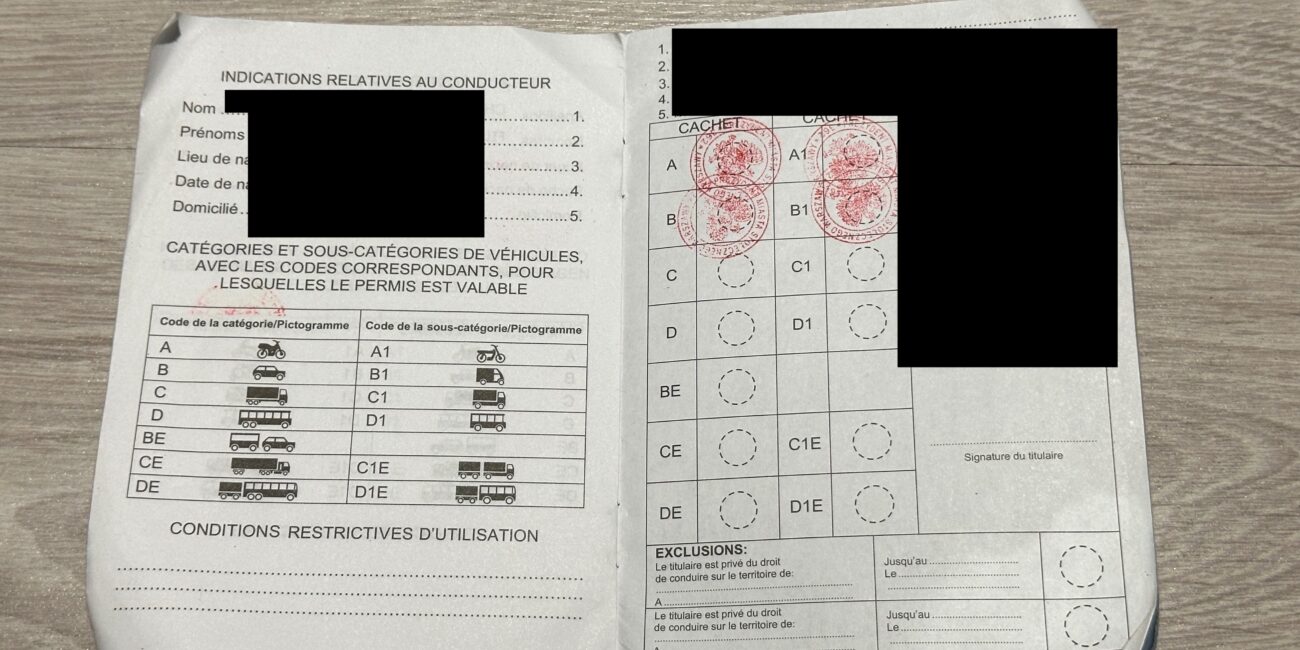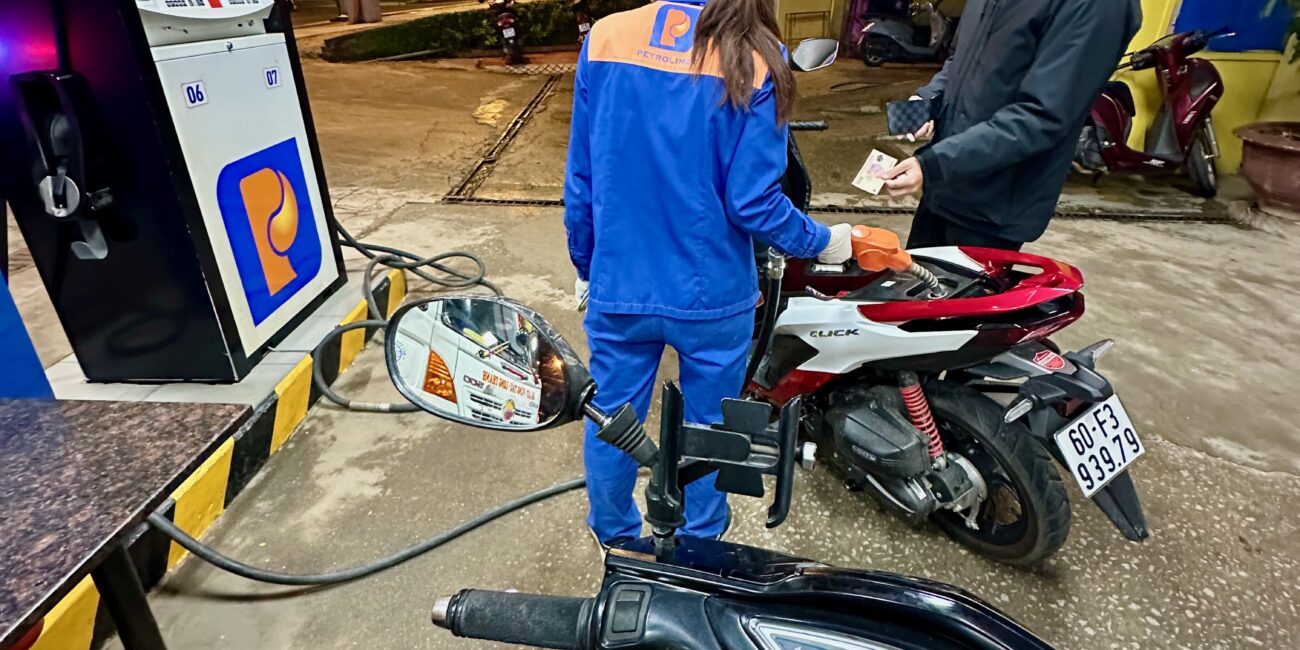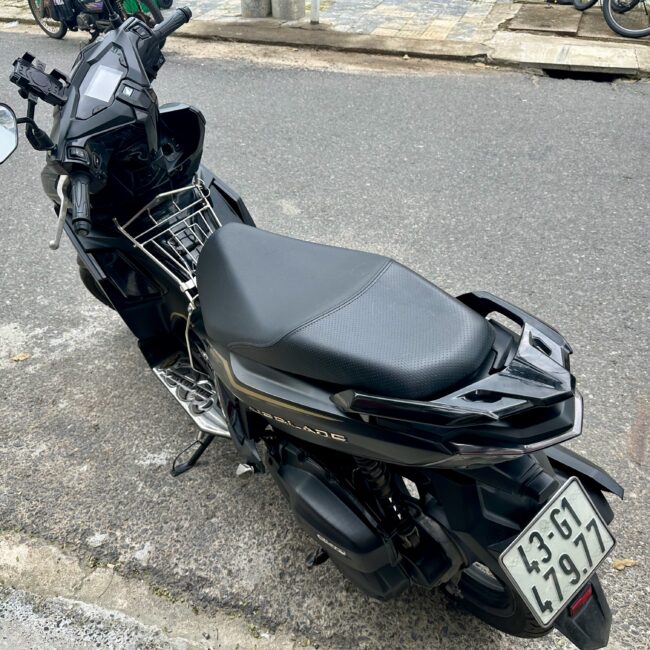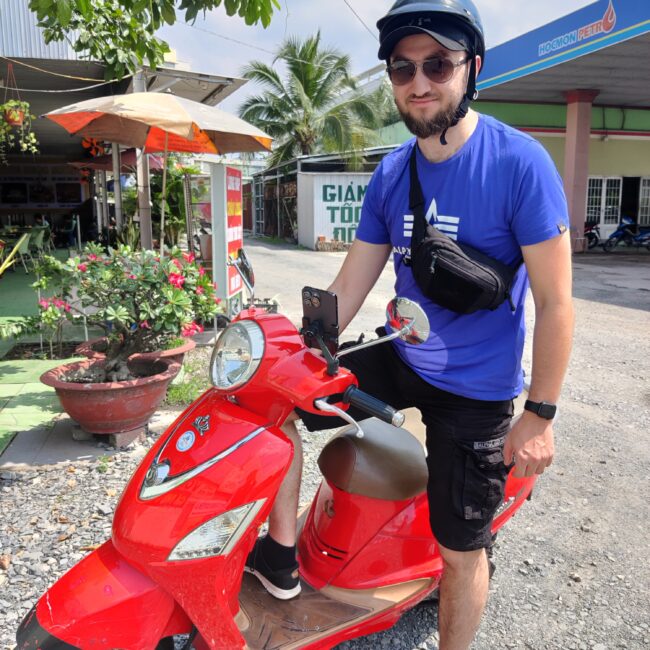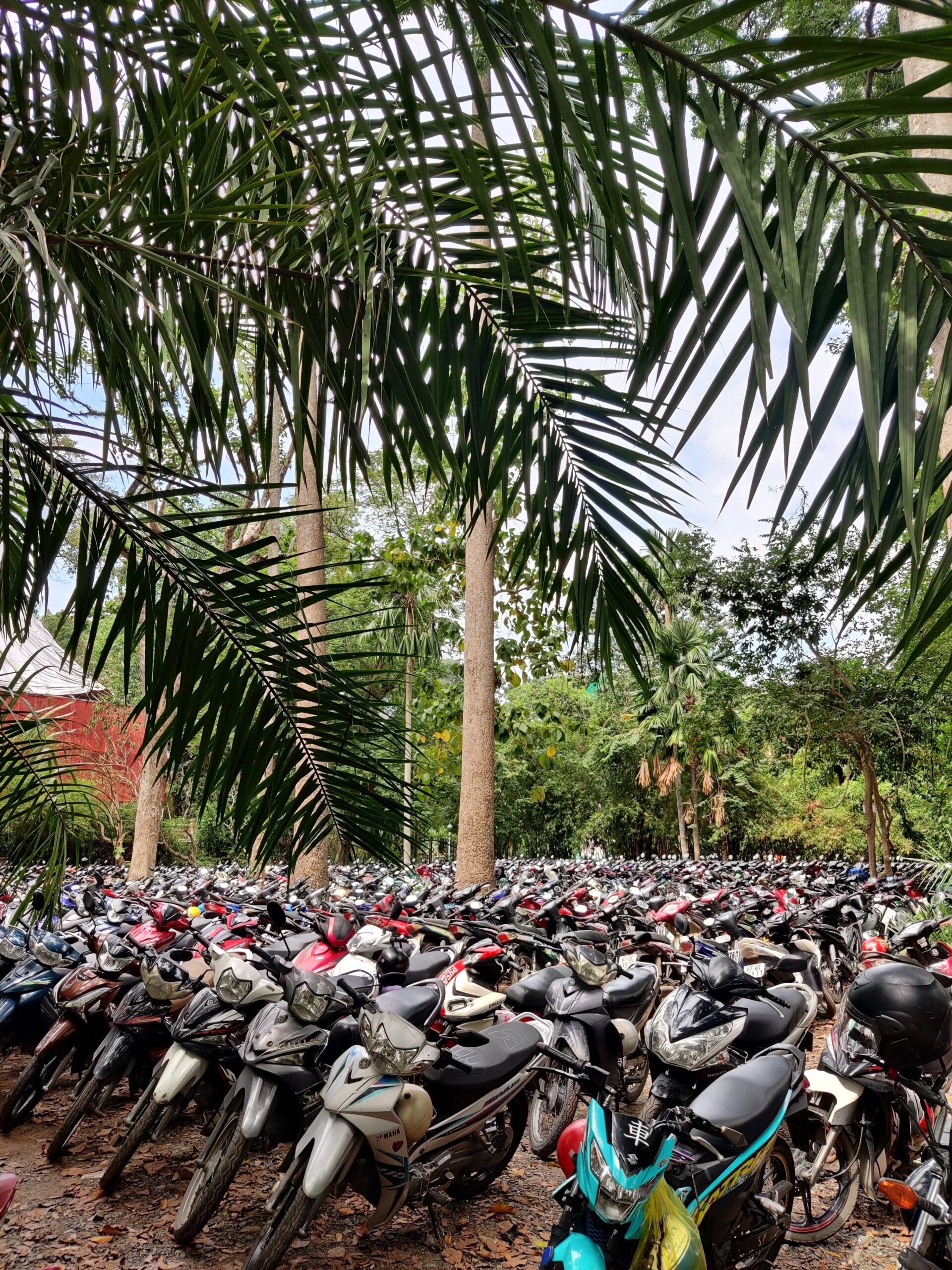This post is also available in:
Polski
Hello! 👋
Traveling around Vietnam is an unforgettable experience, and renting a scooter is one of the best ways to discover the beauty of this country. From the perspective of two wheels, you can truly feel the authentic atmosphere of Vietnam.
Renting a scooter is not only a pleasure but also quite a challenge. The traffic in Vietnam operates by its own rules, which can be quite surprising for tourists. In this article, we’ll share our experiences – from renting a scooter and handling the formalities to tips on how to move safely on the roads and avoid unpleasant situations.
What was our journey like?
Our trip to Vietnam in November 2023 was full of impressions, surprises, and interesting experiences. 🚶♂️ 🌿 We traveled through several cities – from the vibrant Ho Chi Minh City, through the atmospheric Da Lat, the coastal Da Nang, picturesque Sapa, to the capital, Hanoi.
In the five parts of our travelogue, we’ve described in detail what we managed to see, where we ate, how we got around, and what to pay attention to while traveling through the country. If you’d like to know our impressions, check out the individual posts – you’ll definitely find plenty of inspiration there! 😎 👇
- 👉 Part 1: Ho Chi Minh City
- 👉 Part 2: Da Lat
- 👉 Part 3: Da Nang
- 👉 Part 4: Sa Pa
- 👉 Part 5: Hanoi
Requirements to travel by scooter
Traveling around Vietnam by rented scooter or car is a great way to explore the country on your own terms. However, unlike other countries, the rental process here is much less formalized – which has its advantages, but also certain pitfalls that are important to keep in mind.
Most rental services are small, privately-owned businesses or even individuals running local operations. Here, no one will ask for your credit card, rental history, or have you sign complicated contracts. Instead, it’s usually a quick conversation, a quick inspection of the scooter, and… most often, a request for your passport as a deposit.
Never, under any circumstances, leave your passport behind!
If the rental agent insists, suggest leaving a cash deposit or a copy of your passport instead – this is always a safer option. In case of any issues, recovering your original document might be more difficult than expected.
👮♂️ Legal responsibility – what will the police check?
Just because the rental agent doesn’t ask many questions, it doesn’t mean that the police will be equally lenient. If a traffic stop occurs – and these aren’t uncommon here – you need to be properly prepared.
What will be required:
- Passport – always have it with you, as it is the primary document for identity verification.
- Cat A driver’s license – needed to drive a scooter with a capacity of more than 50 cm³.
- International Driving Permit (IDP) – in accordance with the Vienna Convention of 1968. This is an absolute must, without which driving can end in a fine.
- Helmet – do not travel in a vehicle without a helmet on.
The police in Vietnam are quite strict when it comes to checks. If you’re missing any of these documents, you may be forced to pay an on-the-spot fine, and in the worst case, the vehicle could be confiscated.
Personal responsibility
Unlike European countries, rental agencies in Vietnam are not overly concerned with whether you have the proper driving license. They mainly focus on getting the deposit and renting out the vehicle – the rest is your responsibility.
This means that if an accident occurs and the police find that you lack the necessary documents, the costs of medical treatment, repairs, or fines will fall entirely on you. The insurance provider will not pay any compensation if you do not meet all the required formalities.
International Driving License
If you’re planning to rent a scooter here, having the proper documents is crucial. Unlike some countries where procedures are more formalized, renting a vehicle in Vietnam may seem simpler. However, the responsibility for meeting the legal requirements rests solely with you.
For Polish citizens, obtaining an IDP (International Driving Permit) is relatively simple – you just need to submit an application at the appropriate communication department based on your place of residence, such as the city hall or county office.
You can find application forms on the official websites of the respective offices, and the process usually requires an in-person visit. If you feel a bit lost, we invite you to check out our dedicated post about the IDP. There, you’ll find a detailed guide based on our personal experiences and official information.
👉 Important: Only get your IDP made at official places to make sure the document meets international requirements – whether you’re a citizen of Poland or another country. 😊
To legally drive in Vietnam, you are required to have an International Driving License that complies with the 1968 Vienna Convention.
👉 Check your country’s local regulations and make sure you have both a valid national driver’s license and IDP to legally rent a car and drive. For more information: internationaldrivingpermit.org
Where to rent a scooter in Vietnam?
Vietnam is truly a kingdom of scooters – they’re everywhere, and renting one seems simple and hassle-free. In reality, however, it’s important to approach this with caution, as not every rental shop is trustworthy.
It’s definitely worth using Google Maps and checking reviews about the rental shop. Other tourists’ ratings can save us from unpleasant situations. It’s also a good idea to join local Facebook groups where travelers share current recommendations and warnings.
Don’t trust the first rental shop you come across, especially if you encounter it unexpectedly on the street. Unfortunately, there have been cases of scams where tourists are charged for “alleged” damages to the vehicle. It’s better to make sure that the place you rent the scooter from has good reviews and clear policies.
What costs are involved?
The cost of renting a scooter in Vietnam depends on several factors – location, type of vehicle, and rental period. Generally, prices are quite affordable, especially when compared to car rentals.
Standard scooter (125cc):
- Daily rental: from 120,000-200,000 VND.
- Weekly rental: from 700,000-1,200,000 VND.
- Monthly rent: from 2,500,000-4,000,000 VND.
Automatic scooter (more comfortable):
- Daily rent: 150,000-300,000 VND.
- Weekly rental: 1,000,000-1,500,000 VND.
Larger capacity motorcycles (e.g., Honda XR150):
- Daily rental: from 300,000-600,000 VND.
- Weekly rental: from 1,500,000-3,000,000 VND.
⛽️ Fuel
Current fuel prices in Vietnam are more favorable than in many other countries, including Poland. Various types of fuel are available:
- Gasoline 95 (RON 95-IV): about 21,110 VND/liter.
- Gasoline 92 (E5 RON 92-II): about 19,440 VND/liter.
- Diesel (DO 0.005S-IV): about 17,150 VND/liter.
It is worth noting that fuel prices can vary depending on the region and current exchange rates.
🛣️ Tolls
In Vietnam, tolls apply on highways and expressways, and they are collected at toll booths located at the entrances and exits of these roads.
Motorcycles and scooters with small engine capacities are usually not allowed on highways and expressways. Traffic regulations restrict the use of these vehicles on such roads for safety reasons. Therefore, when planning a scooter trip, it’s best to opt for local roads and avoid highways.
On most local and city roads, there are no tolls for scooters. Tolls generally apply to cars using highways and expressways. However, in some areas, there may be tolls for crossing bridges or tunnels, which can also apply to scooters. Typically, these tolls are small amounts.
Insurance
In Vietnam, scooter rentals are common, but the formalities are often taken lightly. Many rental shops offer vehicles without a formal contract, and if a contract is made, the documents may be simplified. In such cases, the responsibility for any damages or accidents mainly falls on the renter.
Technical condition of the vehicle
Before renting a scooter, it’s important to carefully check its technical condition. While rental shops should provide a functional vehicle, in practice, this isn’t always the case. In the event of a breakdown, such as a flat tire, responsibility is often shifted onto the renter, with the claim that they ran over an obstacle. Therefore, it’s recommended to thoroughly inspect the vehicle before signing the contract and ensure that it is in full working order.
Experience and safety
Riding a scooter in Vietnam is quite different from European standards. Traffic is chaotic, and traffic rules are often ignored. If you don’t have experience riding a two-wheeler, it’s better to practice in your home country before deciding to ride in Vietnam. A lack of skills can lead to dangerous situations on the road.
Travel insurance – the basis for safe travel
Vietnam is a country that delights with its beautiful landscapes, but also surprises with chaos on the roads. That’s why travel insurance is essential before renting a scooter – and even before the trip itself. It can not only save your health but also your wallet in case of unforeseen events.
In many cases, a good travel insurance policy covers medical and rescue expenses. However, it’s important to check whether it also includes financial protection in case of damage to the rented vehicle. Some policies allow you to recover the deposit you had to leave with the rental agency.
However, reading the General Terms and Conditions (GTC) is essential, especially if you plan to ride a scooter or motorcycle. The policy may contain specific requirements regarding attire, documentation, and the type of vehicle covered.
Real life examples
For example, Revolut once required in its terms that the scooter rider wear full motorcycle gear, including gloves and protective boots. Failing to wear such gear meant that in the event of an accident, no compensation would be paid.
The fact that locals often ride without helmets, in flip-flops, and on scooters larger than 50 cc is their own risk. However, this does not mean that as tourists we can act the same way – the rules are much stricter when it comes to foreigners.
Accidents in Vietnam do happen – and often. Unfortunately, stories about tourists who became “vegetables” after falling off scooters, and their families having to organize fundraising to bring them back home, are not exaggerated. Medical transport costs can reach tens, if not hundreds of thousands of PLN.
Road rules and road reality
In Vietnam, traffic flows on the right-hand side of the road, just like in Poland. However, the reality on the roads can surprise even experienced drivers. You’ll often encounter driving against traffic, sudden lane changes, and the disregard for traffic lights.
- Urban areas (built-up area): 30-40 km/h
- Rural roads (outside built-up areas): 40-60 km/h
- Expressways and highways: 80-100 km/h
There is a strict policy regarding driving under the influence of alcohol in Vietnam. The legal blood alcohol limit for drivers is 0.5‰.
Vietnam’s traffic can be chaotic. Drivers often disregard traffic rules, and pedestrians must be prepared for unexpected maneuvers by vehicles. It’s common to see drivers taking turns without stopping or driving against the flow of traffic.
How to avoid additional fees?
Avoiding extra fees and hidden costs when renting a scooter in Vietnam is key to preventing unpleasant surprises. Rental agencies often operate on informal terms, so it’s important to be prepared and pay attention to a few key details.
- 💵 Agree on the price upfront: Before agreeing to rent, make sure you fully understand the total rental cost — whether it’s per day, week, or month. Always ask about:
- Deposit – how much it is, in what currency and under what conditions it is returned.
- Additional charges – such as for late return of the vehicle, damage or loss of keys.
- 📸 Document the vehicle’s condition: Before leaving with the rented scooter, take photos or record a video showing its technical condition. Focus on scratches, cracks, and any damage, especially on: the bodywork, mirrors, lighting, and tires.
- 🛂 Don’t leave your passport: Never agree to leave your passport as a deposit. This is a practice used by some rental shops but is risky. If the owner insists, it’s better to leave a cash deposit or a copy of the document.
- 🛡️ Insurance: Make sure that your rented scooter has equivalent liability insurance. It’s also worth checking if your travel insurance covers riding a motorcycle – as long as you have the appropriate driver’s license.
- 📝 Read the Contract: If you sign a contract, make sure you understand all of its terms – especially those concerning vehicle return and potential penalties. If something is unclear, ask questions or consider walking away.
- ⛽ Fuel: Scooters are usually rented with either an almost empty or full tank. Make sure to clarify whether you need to return the vehicle with the same fuel level. Otherwise, the owner may charge extra for the missing fuel at a higher rate.
Additional points to keep in mind
- 🏍️ Test the scooter before renting: Check if the scooter starts without any issues, ensure the brakes are working, lights and horn are functional, and the tires are not worn out. If something isn’t working properly, report it before signing the rental agreement.
- 🔧 Avoid “sudden repairs”: Sometimes, rental shops work with local mechanics who extort money for fake repairs during your trip. Always check the scooter carefully and make sure everything is in working order before you set off.

